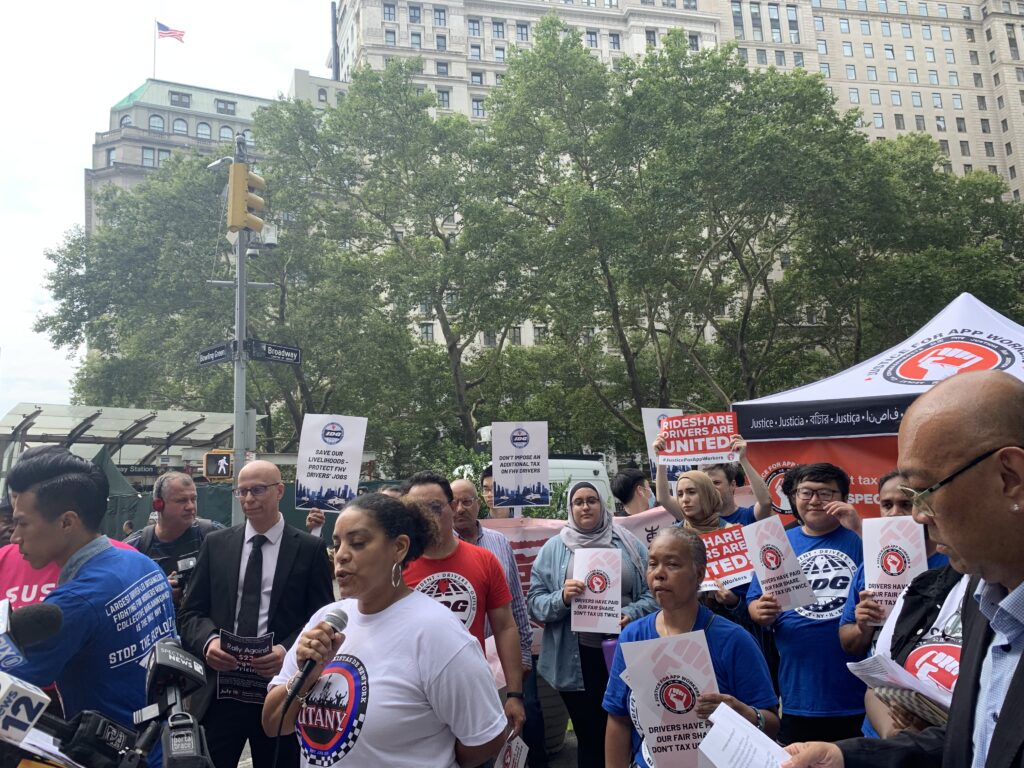
Rideshare workers protesting outside MTA headquarters.
By Carmo Moniz | news@queensledger.com
Delivery and rideshare app workers are demanding to be exempt from the Metropolitan Transportation Authority’s planned congestion tax, a fee ranging from $8 to $23 that will be charged to anyone entering Manhattan from below 60th Street.
These workers already pay a for-hire transportation specific tax of $2.75 every time they enter the city from below 96th Street, and are urging the MTA not to impose an additional tax. The agency has not yet decided on what groups will be exempt from the tax, and has received requests for exemption from more than 120 different groups.
On Wednesday, the same day the MTA’s Traffic Mobility Review Board held a public hearing to discuss the details of the congestion pricing plan, dozens of drivers with the organization Justice for App Workers took to the agency’s headquarters to voice their frustrations.
“We understand, the MTA needs money, but we can’t be the people that they turn to to get the money all the time,” said Justice for App Workers co-chair Naomi Ogutu. “We are people who don’t want trouble, but then every time they want to come to us to get extra taxes, they want to get extra money from us, for how long are we going to be milked by this city?”
The MTA is currently projected to have close to a $3 billion budget gap by 2025 due to declining fare revenue and COVID-19 funds drying up.
Larry Penner, a transportation advocate and who worked in the transit industry for over 30 years, said the different groups looking to receive exemptions are creating “tremendous political pressure” for the MTA to grant them, but that allowing more exemptions will lead to less revenue.
“You need political clout,” Penner said in an interview. “It’s a question of who their lobbyists are and who their elected officials are.”
The congestion pricing plan is expected to bring $15 billion in revenue for the MTA’s capital plan, which is aimed at improving public transit infrastructure. It could be implemented as soon as this coming spring.
“The number of taxi and For-Hire Vehicle trips has doubled in recent years while travel speeds in Manhattan dropped precipitously,” MTA spokesperson John J. McCarthy said in a statement. “Congestion pricing provides a solution and improves mass transit for the vast majority of people.”
The plan was recently hit with a lawsuit from New Jersey officials claiming that it would unfairly impact the state’s residents, both financially and environmentally. The federal lawsuit calls for a more in-depth environmental review of the pricing plan, and was followed by a similar lawsuit from Staten Island Borough President Vito Fossella.
McCarthy denied that not enough study was done ahead of the federal government’s approval of the plan, adding that New Jersey residents and public officials had multiple opportunities to voice their concerns during the outreach process.
“This lawsuit is baseless,” McCarthy said in a statement. “We’re confident the federal approval — and the entire process — will stand up to scrutiny.”
Asad Ijaz, a Brooklyn native who has been driving for Uber and Lyft for over nine years, said that the tax would prevent him from picking up larger fares in Manhattan and keep him confined to driving in Brooklyn, Queens and the Bronx.
“We are delivering New Yorkers from point A to point B, if we have to go empty-handed to Manhattan that’s going to be unfair,” Ijaz said. “The only thing is to keep fighting with the MTA not to implement this, we have to gather and we have to fight.”
A day before the protest, five Brooklyn pols signed a letter to the TMRB chair calling for the congestion tax pass down to passengers using services like Uber and Lyft, rather than be paid by drivers.
The politicians, including Greenpoint Assemblymember Emily Gallagher and North Brooklyn State Senator Julia Salazar, proposed increasing the $2.75 tax that drivers already pay when entering from below 96th Street, with the added cost being paid by the passenger. Discounts would be provided at night, and yellow cab rides would be exempt from the added tax under the proposal in the letter.
“Our view is that taking an Uber from Tribeca to Central Park is a luxury and should be priced as such,” the letter reads. “Concerns about worker dislocation should be taken with utmost seriousness during the shift to new policies and technologies, but we should not accept the argument that polluting industries be protected for the sake of preserving jobs and profits.”
Another group of 16 politicians representing communities in Brooklyn, including Gallagher, Salazar and councilmember Lincoln Restler, signed a letter addressed to the TMRB calling for tolling fees to be equalized across entrances to Manhattan.
“We are focused on making sure that no single crossing into Manhattan disproportionately bears the burden of traffic,” Restler said in an interview. “I hope that the Traffic Mobility Review Board will take our concerns into account as they develop policies for how congestion pricing will work.”



